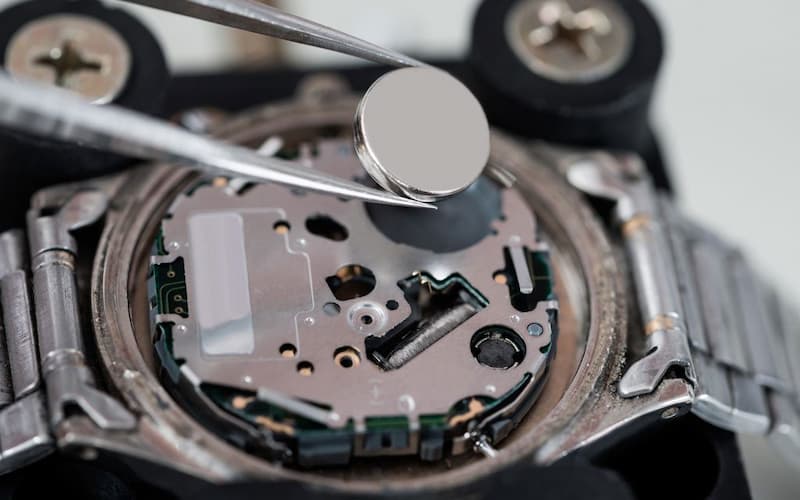Are you interested in “how long does a watch battery last?” How will I know when to change the battery in my watch? How much does It cost to replace a battery in a watch? How long will my replacement battery last? Don’t worry, I will answer all the questions in the following post.
On average, a watch battery lasts for about two years. Its functions, age, how long it has been stored at the manufacturer, etc. are just a few examples of the many variables that can affect this. The lifespan of some watch batteries ranges from 14 to 24 months, while that of others can reach 6 years.
The lifespan of a watch battery can be impacted by various factors. For instance, does your watch have features like alarms or LED displays? If so, they will eventually drain your battery faster than an analog watch would.
The amount of time your watch’s battery lasts will also depend on wear and age. Let’s say, for instance, that you have worn the same outfit for many years. In that case, it is likely that it has come into contact with water and other elements of nature, which will inevitably affect the battery and its ability to supply power for an extended period of time.
Please read on.
Table of Contents
How Will I Know When to Change the Battery in My Watch?
The obvious response would be when your watch has broken, though you might want to avoid that from happening in the first place. Many watches will exhibit “symptoms” of low power; typically, this involves the second hand jumping or skipping a few seconds all at once. You might also notice that your watch is no longer accurately keeping time.
Any of these signs are key indicators that your watch requires a battery replacement. Please take note that if an old battery is left in a watch for an extended period of time, the acids could leak out and cause serious damage to the watch.
How Much Does It Cost to Replace a Battery in a Watch?
Depending on where you get it done and the services provided, changing a watch battery can cost anywhere from $50 to $100. Depending on the brand and general condition of the watch, specialized shops typically charge anywhere from $20 to $50 to replace the battery.
Prepare your wallet if you want more than just a battery replacement. Depending on the brand and type of watch movement, comprehensive watch services can cost $500 per session.
In their flagship locations or other authorized service locations, some brands also provide battery repairs and replacements. Although these options are typically more expensive, they ensure that the battery will meet the brand’s standards. The price of these services varies depending on the brand and can range from $50 to $75 for a battery replacement.
How Long Will My Replacement Battery Last?
From 14 months to two years, replacement watch batteries are good for. Naturally, the actual lifespan is based on how old your watch is. As a general rule, the internal lubricants of an older watch have dried out more.As a result, it takes more energy for your watch to continue moving at its previous speed. It can take up to two or three years before changing the battery because newly-lubricated components in new timepieces require less energy to function smoothly.
How Long Does a Quartz Watch Battery Last?
Depending on the type of movement employed, a quartz watch battery’s lifespan varies. Standard quartz watches typically last one to two years before requiring a battery replacement. The lifespan increases to five or six years when a lithium battery is used.
When the watch display dims, the digital display goes dark, and the alarm function activates, it’s time to replace the quartz battery. Your watch will slow down or stop.
The best alternative to typical quartz watches are solar-powered watches; they can last for well over 25 years without needing any maintenance.
How Often Should a Quartz Watch Battery Be Replaced?
While it varies by watch brand, there are some general guidelines to follow when replacing a quartz battery. Of course, how well you take care of the quartz watch will also affect how frequently you need to replace the battery.
As previously stated, the performance of the watch will let you know when the quartz battery needs to be changed. As you can see, your watch can no longer run when the battery power is low. The voltage will decrease and the internal resistance of the quartz battery will rise as a result. To put it another way, the battery will run out and your watch will stop working.

How Long Does a Kinetic Watch Battery Last?
About 6 to 10 years are spent on a Kinetic watch’s battery. It’s not the typical battery, though, that we’re used to from quartz watches. Instead, kinetic watches run on a unique type of battery, a supercapacitor, which uses the motion of the wrist to create energy.
You must wear a kinetic watch frequently enough to keep it charged in order for it to function. That entails either wearing your watch while going about your daily activities or putting it in a Kinetic watch winder. For too long, your watch will have a stagnant battery if it is left on your nightstand.
Furthermore, a kinetic watch’s battery life will be impacted by repeated charging and discharging cycles. Even an early battery replacement might occur as a result.
How Often Should a Kinetic Watch Battery Be Replaced?
The kinetic watch battery of the supercapacitor should be changed every ten years. The battery will however deplete if it is not kept in motion.
The watch will stop maintaining a full charge when the supercapacitor needs to be replaced. It’s time to replace the supercapacitor because even though you’ve worn it and charged it through movement, the watch still doesn’t function.
Quartz Watches Vs. Automatic Watches
Compared to their quartz-powered counterparts, automatic watches have been in use for a longer time and use a more conventional mechanism to keep time. Automatic watches are still very popular today even though they have found worthy competition in the form of quartz movements.
The absence of a battery is one of the main advantages of wearing an automatic watch over a quartz one. While batteries need to be changed on a regular basis, an automatic watch only needs to be wound manually once in a while. An automatic watch can typically operate solely from the energy captured from your wrist as you wear it.
The weight of this style of timepiece is another benefit of wearing an automatic watch. Because the rotor mechanism, which enables the mainspring to wind itself, contains weight, automatics have a distinct heft to them. Due to this weight, automatic watches frequently have a naturally elegant feel, which gives them a distinctive feel when worn. Conversely, quartz watches are typically much lighter.
Additionally, quartz watches have special advantages of their own. Anyone with a busy schedule will find quartz movement to be especially convenient because it never needs to be manually wound. In contrast to traditional mechanical watches, quartz watches have a much more straightforward and electronically integrated mechanism that uses battery power to keep time.
Both quartz and automatic movement watches have some disadvantages, but none that should deter you from purchasing one of them. In some situations, automatic watches require a little more care than quartz watches because they may need to be wound manually if they go too long without being worn. An automatic will eventually run out of stored energy in its mainspring if it is not worn frequently because the wearer’s wrist movements are its main source of energy. An automatic watch requires the wearer to make a commitment because of this.
However, one potential disadvantage of quartz watches is that their internal mechanisms are much less conventional. Despite having a similar exterior, quartz and automatic watches have very different internal workings.
Purists and people who prefer anything traditional may find mechanical watches and their direct descendants, automatic watches, more alluring due to their rich history. Automatic movement has a longer history than quartz movement, which makes it more recognizable and appealing to some people than quartz movement.
The Lifespan of a Battery
Pick a timepiece that reflects your personality and way of life. A kinetic battery needs to be replaced every ten years if there is sufficient movement. A solar-powered battery needs to be replaced every 50 years and can be charged by either natural or artificial light. However, care, brand, and age are the only factors that can affect a watch battery’s lifespan.
Read about

